Big Red Book
Celebrating television's This Is Your Life
Nick ROSS (1947-)
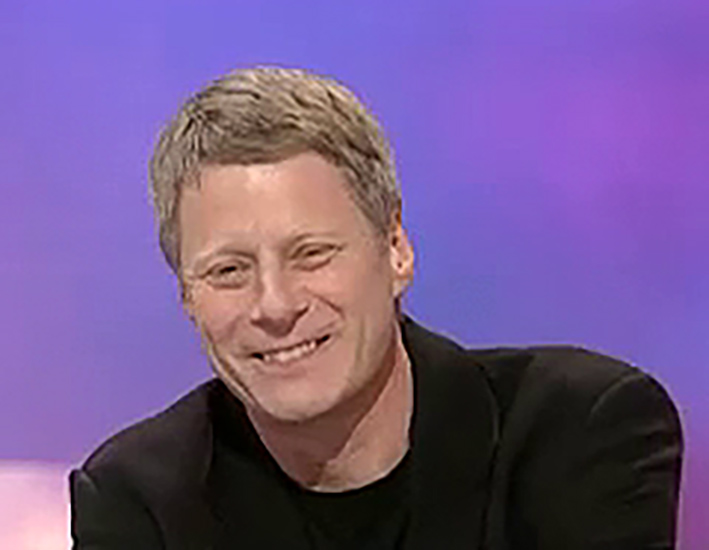
THIS IS YOUR LIFE - Nick Ross, broadcaster and journalist, was surprised by Michael Aspel outside Clear Cut Pictures, a television editing suite in west London, where he had been editing a film for the BBC television programme Crimewatch.
Nick, who was born in Hampstead, London, studied English and Psychology at Queen's University in Belfast. While at university, he began working for the BBC, reporting on the violence during the Troubles in Northern Ireland. In 1971 he was invited to become a reporter on BBC Radio 4's The World at One and later went on to present the station's PM and The World Tonight programmes.
He moved into television in 1979 as a reporter for BBC2's Man Alive. He later became a founding presenter of Britain's first breakfast television programme, BBC Breakfast Time, which launched in 1983 and co-host of another groundbreaking BBC programme, Crimewatch, which began a year later.
"I don't believe it! You swine! Well and truly nicked!"
programme details...
- Edition No: 1093
- Subject No: 1068
- Broadcast date: Thu 14 Feb 2002
- Broadcast time: 8.30-9.00pm
- Recorded: Fri 1 Feb 2002
- Venue: BBC Television Centre
- Series: 42
- Edition: 14
- Code name: Near
on the guest list...
- Joy - mother
- Judith - sister
- Jerry - brother
- Sarah Caplin - wife
- Adam - son
- Sam - son
- Jack - son
- Fiona Bruce
- Sue Cook
- Tim Backhouse
- Bill 'Jock' Ireland
- Anna Carragher
- Roger Cook
- Peter Bazalgette
- Jenny Abramsky
- Egon Ronay
- Francis Wilson
- Debbie Rix
- Esther Rantzen
- Gloria Laycock
- Alan Farthing
- Merlyn Nuttall
- Terry Ogle Filmed tributes:
- David Hatcher
- Dr Martin Haworth
- pupils of Wallington Grammar School
- Sir John Stevens
- David Blunkett
related appearances...
- Jill Dando - Nov 1996
- Desmond Wilcox - May 2000
- Roger Cook - Apr 2003
production team...
- Researcher: Kate Greer
- Writer: Joe Steeples
- Director: John Gorman
- Associate Producer: Helen Gordon-Smith
- Executive Producer: John Longley
- Series Producer: Jack Crawshaw
- Producer: Sue Green
- names above in bold indicate subjects of This Is Your Life
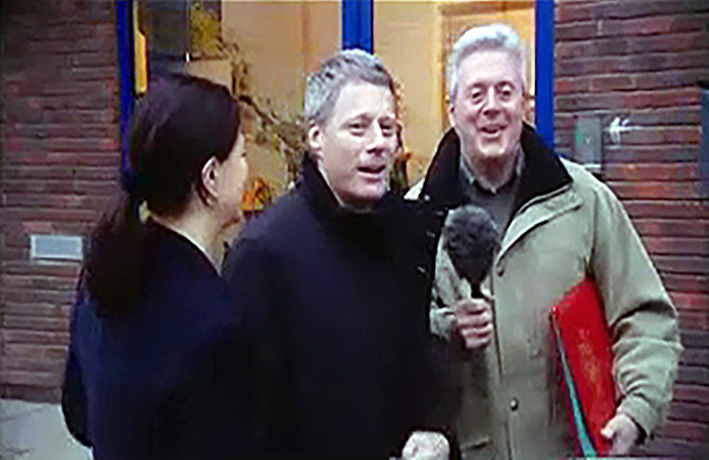
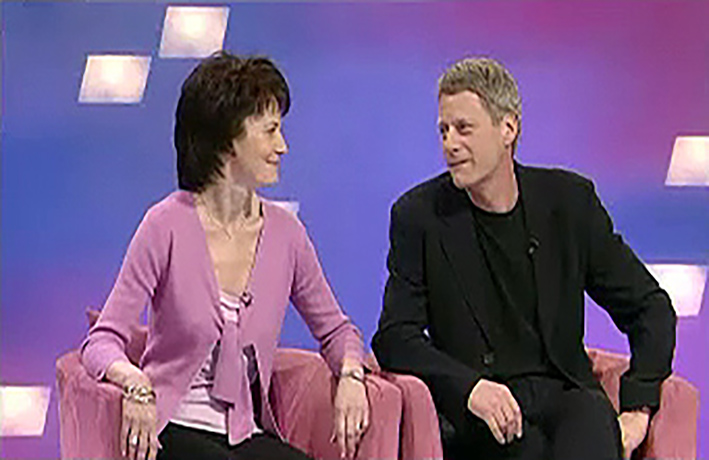
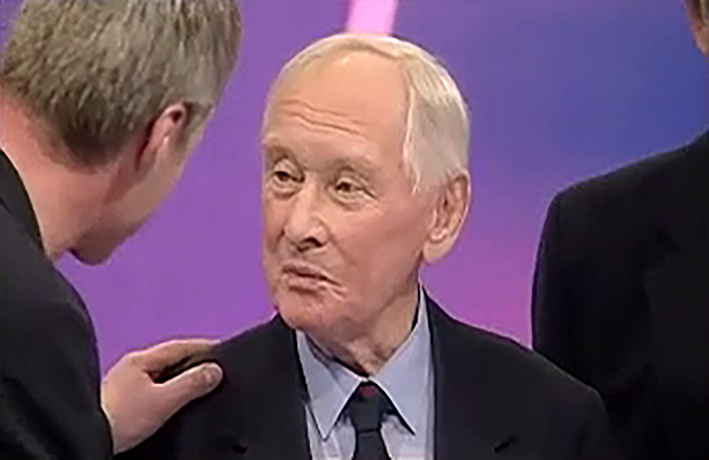
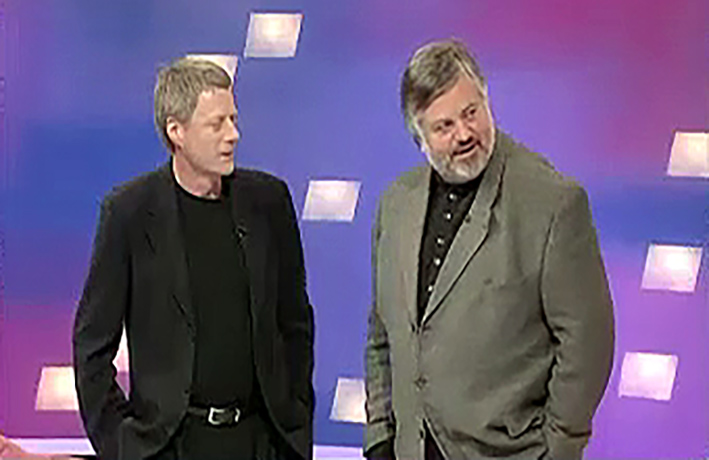
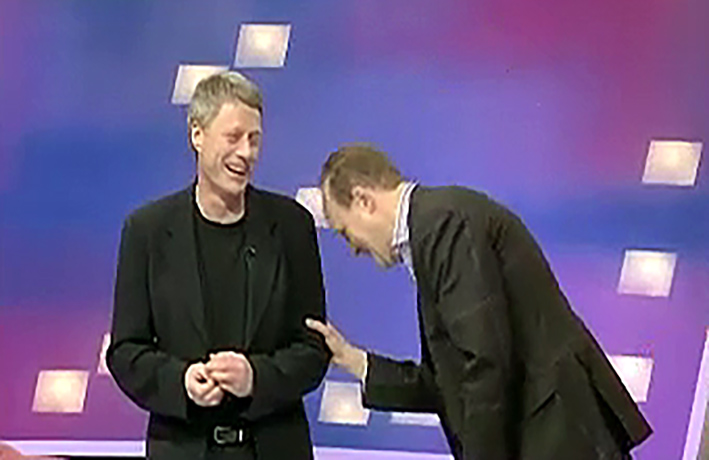
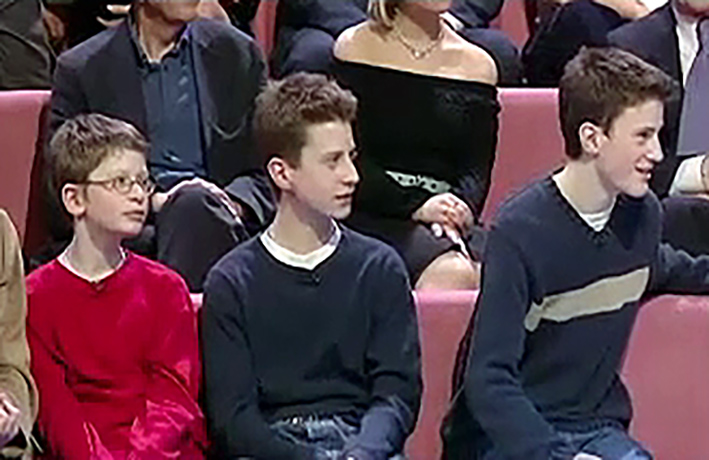
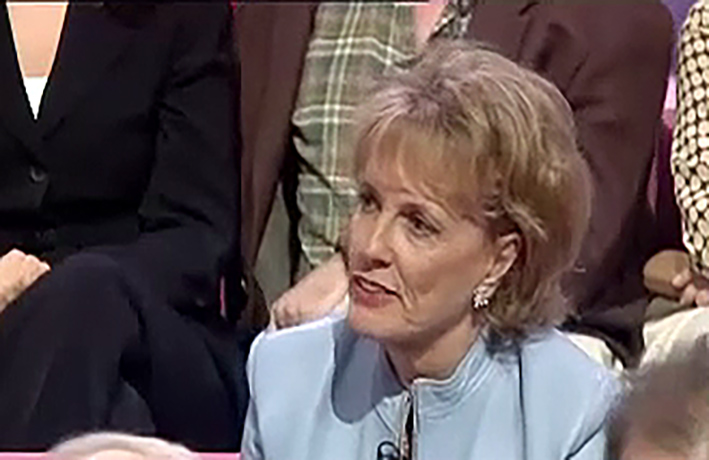
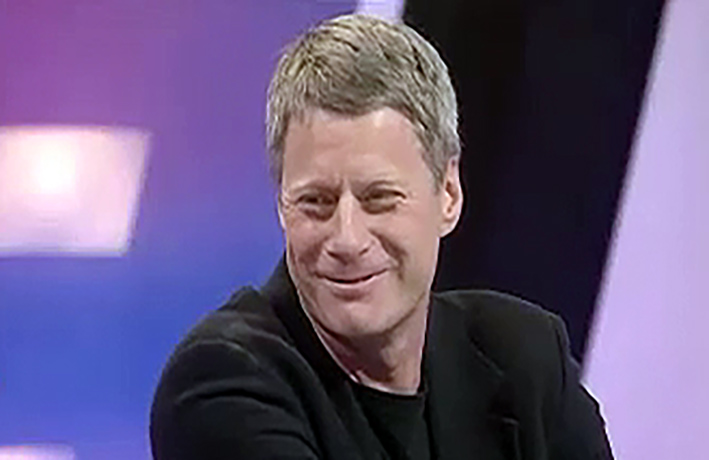
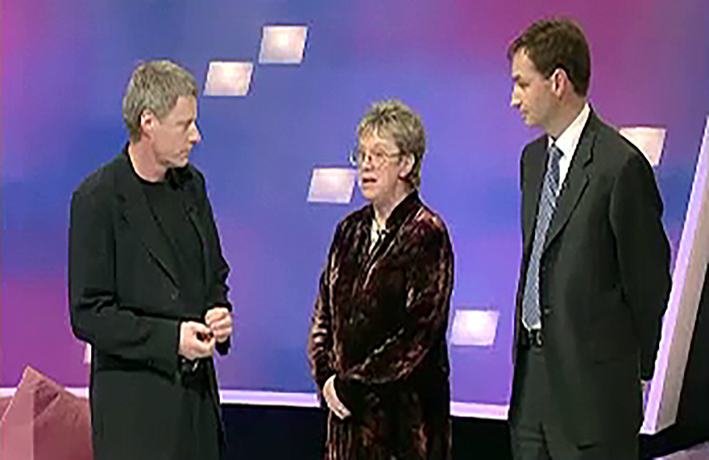
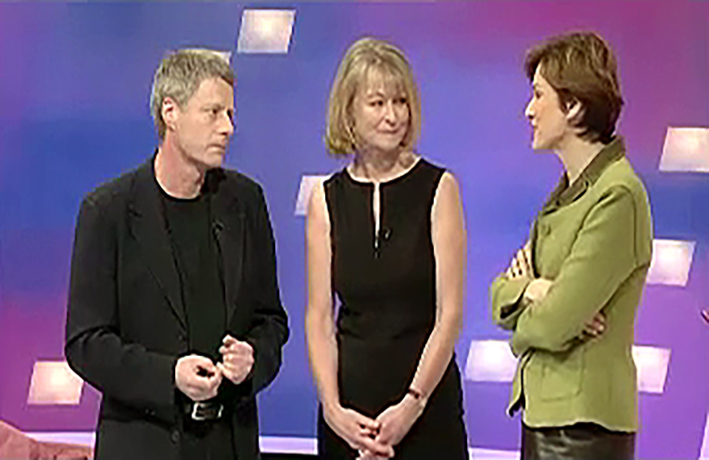
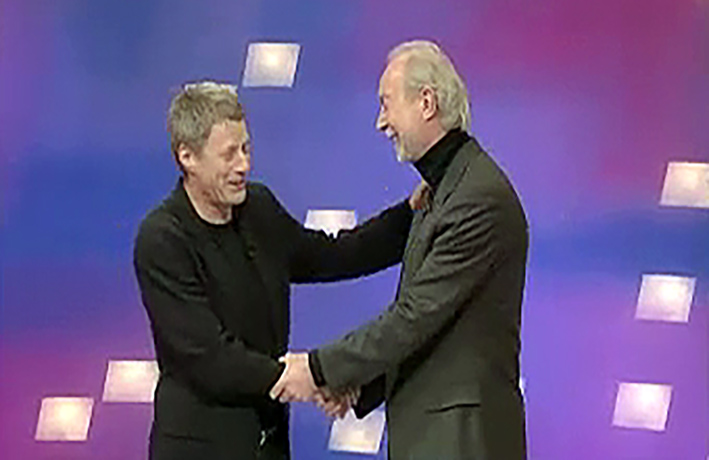
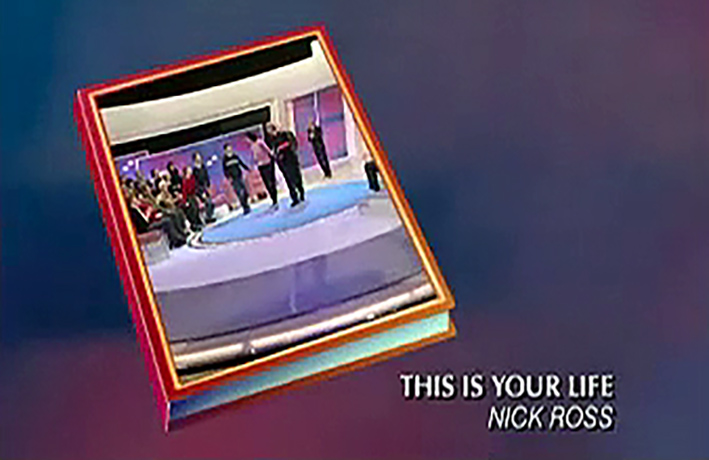
Screenshots of Nick Ross This Is Your Life
What the website does not seem to look into is the sometimes hidden secret about This Is Your Life: that some well-known people didn't want to go on it. You might have thought being presented with the red book was hugely flattering, but in reality not all celebrities have earned celebrity by being extroverts. Some, athletes, for example, had fame thrust upon them; and even journalists and other factual broadcasters are not natural showbiz types, more comfortable with interviewing others or storytelling to a camera lens than performing on a stage. Others simply resented being ambushed. It's well known that the footballer Danny Blanchflower refused to appear and that author Richard Gordon and comedian Bill Oddie also said no, although they both later changed their minds. I am sure many others were reluctant to take part.
In my own case, and long before I was waylaid by Michael Aspel, my wife had casually inquired what she should say if approached by a show like This Is Your Life. I thought about it and said no, I'd rather not, and promptly forgot about the conversation. So when a year or so later a police car raced up to me as I emerged from a Crimewatch cutting room and Michael Aspel leapt out brandishing the book I was not just dumbfounded but, to be honest, appalled. That sounds ungenerous – after all a lot of people had gone to a lot of trouble making a show that was entirely flattering and celebratory – but I felt I was being dragged without consent into a circus ring. I made excuses not to go with Michael to TV Centre and travelled home, hugely undecided. When my wife rang, pretending nothing unusual was going on, I pretended just the same – until she told me the whole studio was waiting and I grudgingly relented.
As no doubt with Richard Gordon or Bill Oddie, the joke was on me. As soon as the door in the studio set slid open and I walked into the lights it was clear my reluctance had been absurdly self-indulgent. My whole family had gathered, friends and colleagues from decades past, even an old teacher – and there was the home secretary - all singing my praises. What's not to like? It turned out to be quite the joyous occasion it looks like on the telly.
But I think you'd be surprised how many people, like I did, had reservations.
News Shopper 15 March 2002
Presenter Nick Ross talks to Jenna Good about attending grammar school, his life's achievements and his amazing career.
For nearly 30 years, Nick Ross has appeared on our screens, but the Crimewatch presenter from Wallington jokes he has never had a "proper job". Yet Ross, known by some as the presenter who cannot put a foot wrong, has won national acclaim with his amazing achievements in his working career since his time at Wallington County Grammar.
These include a Broadcaster of the Year accolade in 1997 for his Radio 4 phone-in Call Nick Ross and in 1999 he won a Best Documentary prize for a personal account of the troubles in Northern Ireland.
Despite this, 55-year-old Nick Ross now a household name whose face is recognised all over the country says: "I always thought when I reached 35, I would grow up and get a proper job!"
But even as a boy at Wallington County Grammar, the star began to shine. Unless, of course, they had been watching BBC's This Is Your Life, which turned the tables on the TV star and made him the subject of the show.
Filmed partly at Wallington County Grammar in the same year as it celebrates its 75th anniversary, the TV celebrity had the fright of his life last month when Michael Aspel confronted him with his notorious red book.
Mr Ross said: "I reacted candidly when I was first approached by Mr Aspel and waited patiently for someone to jump out and shout 'red nose day joke', but when no one did, I became angry."
Ambushed
"I felt as though I had been ambushed as there was someone at every window, and thought everyone in the world knew about it apart from me. We had been editing some movies at the time."
The programme, which aired last month, probably made the eyes of aspiring television presenters green with envy as viewers learned Ross had never dreamt his career would make him one of the UK's most renowned TV presenters.
Speaking to the Guardian, Mr Ross recalled his Sutton roots and some of the personalities from his past. These included his games teacher Bill Ireland, aka "Jock", whom Ross recalls as quite a frightening character, but who was strangely kind to him.
"He was Scottish and used to terrify people but was a really nice guy. And I think because my surname is Ross, he thought I was Scottish and was always really nice to me!"
But Mr Ireland, who is now retired after a lifelong service to the school, had his own memories of Nick Ross.
He told the Guardian: "I knew he wasn't Scottish but I used to wear a kilt which was made of Ross Tartan, which started an in joke where I would say to him, come along kinsman blood's thicker than water".
"The first time he came into his own was when he played Puck in a Shakespeare play in 1961. He was the best Puck I have ever seen off the professional stage."
Mr Ross, who lived with his parents on Woodcote Road for nearly 15 years, was, in fact, invited back to the school in 1986 to present an award at the annual prize-giving. But he admits as a pupil he couldn't wait to leave school.
"Getting out of school and going to university was so exciting."
"I loved university, though Wallington County Grammar did give me a great grounding for a career in broadcasting."
But he says the best jobs are not always in front of the camera, a statement of which he is a great advocate, as he is currently working on about 20 other worthwhile projects which are not nearly as well publicised.
"I need to do the jobs like Crimewatch and other things on television as they pay for the projects which I do voluntarily," he jokes.
Mr Ross became involved in the world of television after studying at Queen's University, Belfast, when, as a proactive pupil, he became involved in student politics after winning the largest popular vote in the student union's history.
He then went over to live in Northern Ireland for seven years, where he conducted academic research into the country's grievances.
"I was desperate to make people on the mainland sit up and see what was happening because nobody cared."
"I've always considered a good journalist to be someone who can engage the reader and make them interested in a 'Cinderella subject' they would not have cared about before."
It was from here that the activist was given his first contract strictly not a job according to Mr Ross.
He recalls: "I was preparing to broadcast live when the cameraman asked me to be gentle with him because it was his first time. I didn't have the heart to tell him it was my first time too."
His other television contracts have included hosting BBC's Breakfast Time in 1983, Crimewatch, now in its 18th year, and TV show Good Driver.
Proud
But after everything he has accomplished in his career, he says: "I am most proud of having a role in helping prevent the number of people killed on our roads."
Mr Ross lobbied highway engineers and the Government to introduce tough targets to cut down on road casualties, which were accepted.
He wanted to see deaths from road accidents drop from a staggering 5,500 per year to 4,000 by 2000, by increasing road safety awareness. By the end of that year, the death toll had dropped right down to 3,417 the lowest since records began.
"You need to engage the public to keep them interested by doing something like comparing the figures with road air traffic," he says.
Another of his many projects has been to help create the Jill Dando Institute of Crime Science. Miss Dando, who was a good friend and fellow Crimewatch presenter, was tragically killed in 1999.
"Her death had a shattering effect, as it would if this happened to any work colleague, because it was such a rare thing to happen," says Mr Ross.
So did he feel vulnerable in his position after the incident?
"No, I never thought her working on Crimewatch had anything to do with her death."
With all this under his belt, does he have any regrets?
"I would have loved to have gone into broadcast management but I realise you can't do everything and I still really enjoy the job I am doing."
Series 42 subjects
Michael Winner | Shaun Williamson | Paddy Ashdown | Tim Smit | Babs Powell | Saeed Jaffrey | Paul Young | Julian ClaryJonah Lomu | Rosemary Conley | Ian Woosnam | Bill Oddie | Fern Britton | Nick Ross | Ray and Trevor Powles
Stephanie Cook | Ian Lavender | Jenny Seagrove | Anita Dobson | Henry Sandon | Linda Barker | Brigit Forsyth
Christina Noble | Claire Sweeney | Lloyd Scott | Julian Fellowes